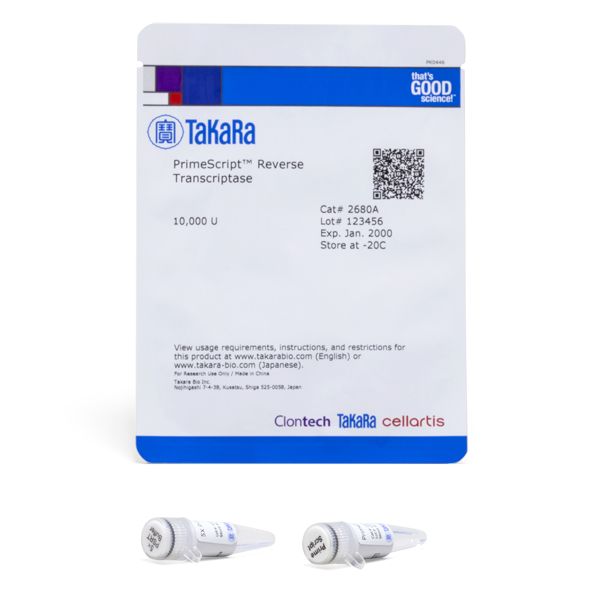PrimeScript Reverse Transcriptase
PrimeScript Reverse Transcriptase
PrimeScript Reverse Transcriptase is a modified MMLV (Moloney Murine Leukemia Virus) RTase. This enzyme has extremely high extension capability and can synthesize long first-strand cDNA efficiently. Even for difficult templates, including RNAs with complex secondary structure, it is possible to synthesize first-strand cDNA at the normal reverse transcription temperature (42℃) with this enzyme. It is not necessary to perform the RT reaction at higher temperatures (a condition that may cause RNA degradation). This enzyme is suitable for preparation of long cDNAs, for construction of cDNA libraries that include full-length cDNA, etc.
Overview
- Strong strand-displacement and extension capability: capable of synthesizing long and full-length cDNA molecules (up to 12 kb)
- Preparation of cDNA at 42°C results in lower background and higher cDNA yields because the lower temperature does not promote RNA degradation
- Outstanding accuracy: lowest error rate among five commercially available reverse transcriptases tested
- Highly specific: low rates of non-specific annealing, even on incompletely denatured RNA
- Works on challenging templates: excellent results even with GC-rich templates and templates with high levels of secondary structure
- Highly sensitive: use less of your precious RNA samples
- Demonstrated success with reverse transcription reaction times of 30 min (60 min for longer transcripts)
Applications
- RT-PCR
- First-strand cDNA synthesis
- cDNA probe preparation
- Synthesis of cDNA libraries with a high proportion of full-length cDNAs
Highly accurate reverse transcription with PrimeScript Reverse Transcriptase

Highly accurate reverse transcription with PrimeScript Reverse Transcriptase. First-strand cDNA synthesis reactions were performed using PrimeScript Reverse Transcriptase or other commercially available RTases. The template for all reactions was Human Placenta Total RNA (Takara Bio). All reactions used an oligo dT primer and were performed according to the recommendations of each manufacturer. After synthesizing cDNA, PCR amplification was performed with highly accurate PrimeSTAR HS DNA Polymerase (target gene: TF, amplification product: 500 bp). A control reaction was included in which PCR was performed (no reverse transcription step). Amplified fragments were cloned and multiple clones from each reaction were sequenced. Error rate was defined as the number of errors per total bases sequenced for each reaction type (~200,000 bases). With only 7 errors out of 201,297 bases (0.0035% error rate), PrimeScript Reverse Transcriptase showed the highest accuracy of all RTases studied.
cDNA synthesis with low background, excellent extension, and high yield at 42°C by PrimeScript Reverse Transcriptase in comparison to six other commercially available RTases

cDNA synthesis with low background, excellent extension, and high yield at 42°C by PrimeScript Reverse Transcriptase in comparison to six other commercially available RTases. RNA ladder (1 kb, 2 kb, 4.4 kb, 6.4 kb, 8.4 kb, 10 kb, and 12 kb) was used as template for first-strand cDNA synthesis reactions. Reactions were performed at 42°C according to the recommendations of each manufacturer. Equivalent reaction volumes were analyzed using alkaline denaturing gel electrophoresis and products were detected with green intercalating dye and fluorescence image analysis. Reactions performed using PrimeScript Reverse Transcriptase showed the highest yield of full-length cDNA product and lowest background.


